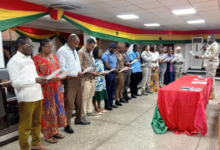Manual on low volume roads launched in Accra
A manual designed to set standards for low volume roads was on Tuesday, launched in Accra.
Low volume roads are feeder roads that are not tiled in most communities.
The 500-page document is set to ensure locally available materials and local skills and experience to ensure the relevance, value for money, safety and sustainable low volume roads.
The manual has three parts with detailed contents on policy, geometric design and road safety materials, pavements design and construction, hydrology, drainage and roadside stabilisation.
The Deputy Minister of Roads and Highways, Anthony Karbo, who launched the manual on behalf of the Sector Minister, Kwasi Amoako Atta, said the manuals were vital to the development of the country.
The development of the road sector, he said, remained pivotal in the development agenda of the government, hence the need to adopt policies that would give the sector value for money.
The deputy minister stated that the government continued to commit resources toward the development of the road sector, adding that “the resources when not well utilised, would be great disservice to the country because these resources starts from proper project identification, planning, designing, procurement, construction and maintenance.”
He said the demand for high quality roads by the public was loud for everyone to hear, as such, proper planning and designing was a “sine-qua-non” to high quality road network.
Mr Karbo noted that the low volume roads led to most villages, homes, markets, mosques and schools in most communities and were not tarred.
“These roads are the wealth of our nation, which is a tool for social inclusion, economic development and environmental sustainability”, adding, “indeed if the quality of our road asset is an indication of development, then their management is a measure of governance.”
Mr Karbo said the designing of high quality low volume roads should commensurate standards, specification, design guides and manuals.
“It was in light of these that the ministry requested the support of the Department for international Development (DFID) through its African Community Access Partnership (AFCAP) research programme to assist in developing low volume design manuals,” he added.
He said that the manuals would provide the basis for constructing, rehabilitating or upgrading low volume roads to meet international good practices relevant to the Ghanaian context.
Mr Karbo assured that the ministry would continue to adopt measures to ensure the country’s road sector remains sound through proper designs, construction and maintenance.
The immediate Past President of the Ghana Institution of Engineering, Mr Steve Anoff Amoaning-Yankson, urged for thoughtful engineering solutions that would lead to a desirable economic option.
He said the current crop of engineers should uphold the highest ethical standards during the design of the nation’s road infrastructure.
The Technical Director Manager for West Africa, Research for community Access Programme (RECAP), said Ghana was among some 12 African countries that had benefited from a 24 million Great Britain Pounds allocation on six regional projects.
BY LAWRENCE VOMAFA-AKPALU







